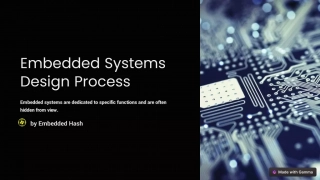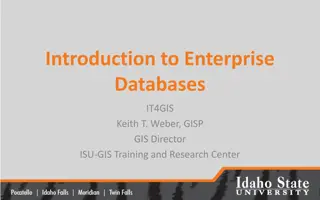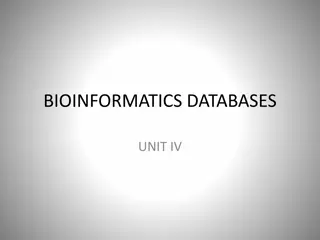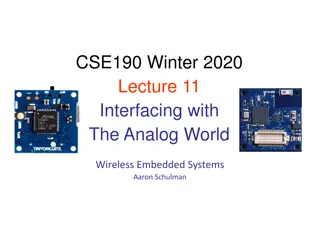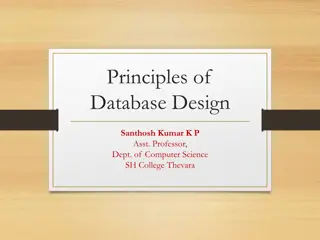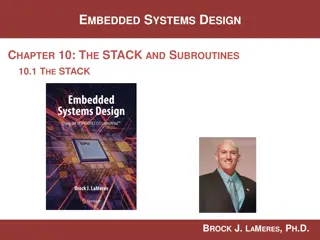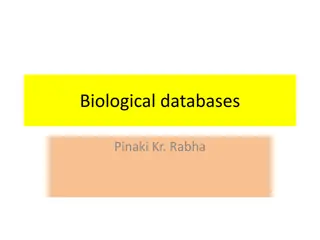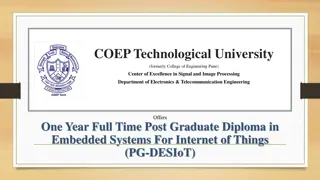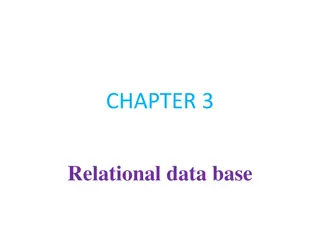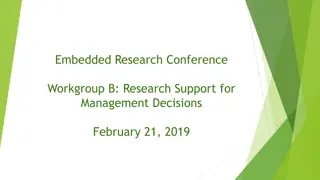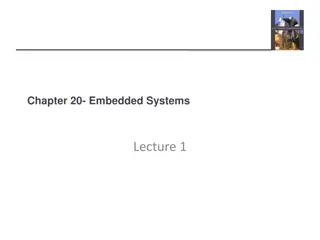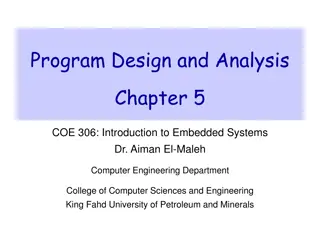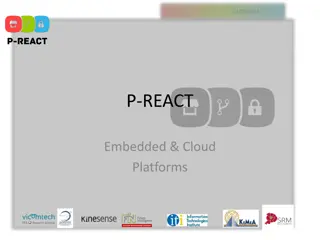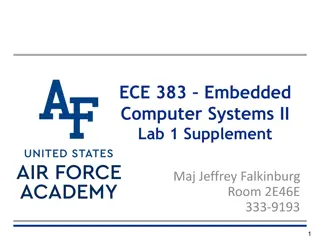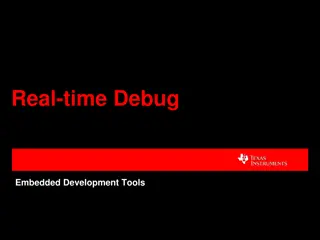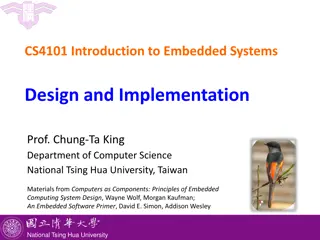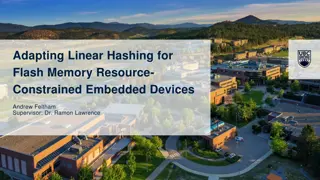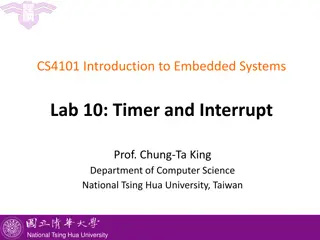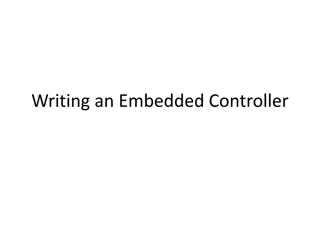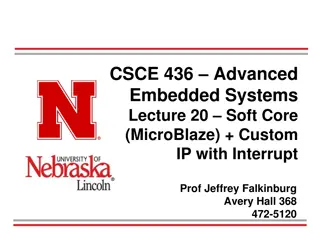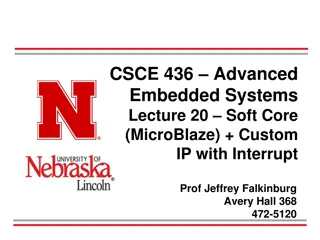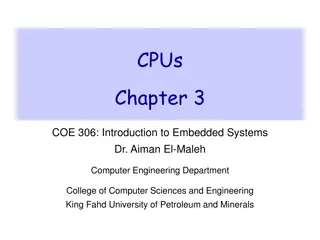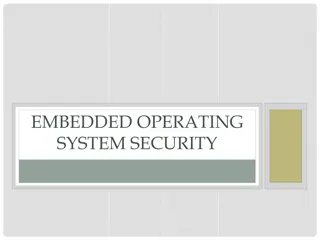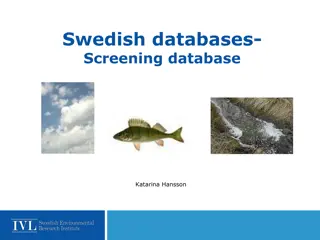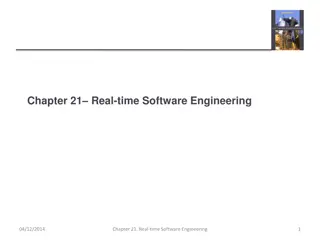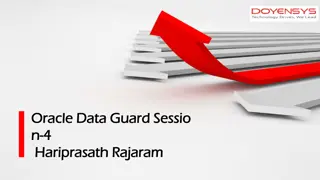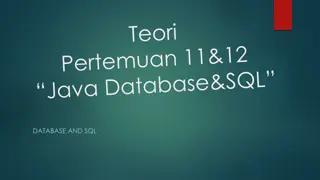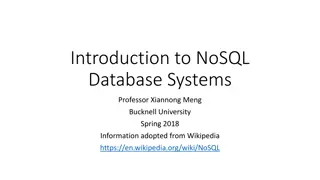Embedded Systems Design Process in the Embedded systems
Embedded systems are all around us, from the tiny microcontrollers in our household appliances to the sophisticated control systems in cars and aeroplanes. But how are these systems designed? Let's delve into the basics of the embedded systems design process in simple terms that anyone can understan
2 views • 9 slides
Understanding Databases and Database Applications
Databases are collections of related data used to store known facts with implicit meanings in a structured manner. A Database Management System (DBMS) is crucial in managing databases efficiently by defining structures, loading data, manipulating content, ensuring security, and facilitating data acc
1 views • 15 slides
Introduction to Enterprise Databases for GIS Professionals
Explore the world of enterprise databases through a GIS perspective with a focus on concurrent clients, database administration, creating databases/tables, checking service names, unique features, numeric data types, data type parameters in ArcGIS, and character data types. Gain insights into managi
0 views • 52 slides
Understanding Embedded Clauses in Writing
Explore the use of embedded clauses in writing through examples and practice exercises. Learn to identify main and subordinate clauses, conjunctions, and create sentences with fronted adverbials. Enhance your writing skills by understanding the structure and function of embedded clauses.
0 views • 12 slides
Exploring the World of Bioinformatics Databases
Bioinformatics databases are essential tools in handling molecular biological data, classified into sequence and structure databases. Primary databases store raw data, while secondary databases contain curated information for research. Examples include GenBank, Protein Data Bank, and SWISS-Prot.
1 views • 38 slides
Interfacing with Analog Signals in Embedded Systems
Exploring the conversion of analog signals from the physical world into electrical signals using transducers in embedded systems. Learn about going from analog to digital representation, choosing sample rates, the Shannon-Nyquist sampling theorem, importance of anti-aliasing filters, and the necessi
0 views • 18 slides
Database Design Principles and Management Overview
This document presents an overview of database design principles, including structured, semi-structured, and unstructured data types. It delves into the role of Database Management Systems (DBMS) in defining, constructing, manipulating, and sharing databases effectively. It also covers various types
0 views • 47 slides
Understanding The Stack in Embedded Systems Design
The stack plays a crucial role in embedded systems design by providing a last-in, first-out storage structure for dynamic memory allocation. In this chapter, Dr. Brock J. Lameres explores the concept of the stack, its physical implementation in microcontrollers like the MSP430FR2355, and the operati
2 views • 27 slides
Embedded Laser Safety Training at University of Michigan
This presentation focuses on embedded laser safety training at the University of Michigan, covering topics such as laser hazards, responsibilities of lab directors, safe usage of equipment containing lasers, and what to do in case of injuries. It emphasizes the importance of identifying risks, avoid
0 views • 27 slides
An Overview of Biological Databases in Bioinformatics
Biological databases play a crucial role in bioinformatics, storing vast amounts of data related to nucleotide sequences, protein sequences, and more. These databases are publicly accessible and essential for research in biological fields. Primary databases, such as GenBank, EMBL, and DDBJ, contain
0 views • 13 slides
Introduction to Embedded Systems Design
Embedded Systems Design, Chapter 1 provides an insightful overview of embedded systems, distinguishing them from general-purpose computers. The chapter delves into the characteristics of embedded systems, their design considerations, and the various types of embedded computers such as general-purpos
1 views • 7 slides
COEP Technological University Offers Post Graduate Diploma in Embedded Systems for Internet of Things
COEP Technological University, formerly known as College of Engineering Pune, is offering a one-year full-time Post Graduate Diploma in Embedded Systems for Internet of Things (PG-DESIoT). This program addresses the increasing demand for expertise in embedded systems and IoT applications. It include
0 views • 16 slides
Understanding Relational Databases and File-Based Systems
This chapter delves into the fundamental concepts of databases, comparing them to file-based systems, and highlighting the significance of relational databases in modern integrated AISs. It explores the difference between logical and physical views of databases, introduces key concepts such as DBMS
0 views • 70 slides
Embedded Research Conference Workgroup B: Management Decisions Support
Workgroup B at the Embedded Research Conference focuses on providing research support for management decisions. The participants aim to identify and prioritize operational questions that could benefit from embedded research, work productively within the existing QI ecosystem, and create an inventory
0 views • 14 slides
Understanding Embedded Systems: A Comprehensive Overview
Embedded systems play a crucial role in controlling various devices and machines. They require real-time responsiveness for correct functioning, making timing analysis and architectural patterns essential. Embedded system design involves considering hardware and software interactions, system charact
1 views • 46 slides
Understanding Databases and Search Methods in Legal Research
Dive into the basics of legal search using Fastcase, exploring the concept of databases, integrated vs. non-integrated content, indexed and full-text databases, along with examples and the benefits of natural language searching in legal research. Gain insights on the types of databases, how informat
0 views • 20 slides
Introduction to Embedded Systems and Software Components
Embedded systems play a crucial role in various applications, with components like state machines, circular buffers, and queues being essential. State machines help in maintaining system behavior, while circular buffers are useful in digital signal processing. The use of queues aids in managing task
0 views • 78 slides
Cutting-Edge Embedded and Cloud Platforms Unveiled on 13th September 2024
Unveiling the futuristic P-REACT Embedded System on 13/09/2024, boasting easy installation, real-time reconfiguration, and standalone operation capabilities. Dive into the architecture and modules of this system, including the Embedded System Manager, Sensors Manager, Clip Generator, and more. Explo
0 views • 11 slides
Exploring Embedded Librarianship in Academic Health Sciences Programs
This content delves into the concept of embedded librarianship in academic health sciences programs, showcasing cases and insights from the frontline. It highlights the various roles and responsibilities of embedded librarians, including providing research assistance, creating tutorials, engaging wi
0 views • 26 slides
Embedded Computer Systems Lab 1: VGA Module Overview
This document provides an overview of Lab 1 for Embedded Computer Systems II, focusing on the VGA module and its functionalities. It includes details about the VGA module entity, its ports, clock signals, trigger voltage and time representation, channel signals, color intensities, row and column val
0 views • 18 slides
Understanding Real-time Debug Techniques for Embedded Development
Real-time debugging in embedded systems involves different modes like stop mode and real-time mode, each offering unique capabilities for accessing memory, registers, and handling interrupts. This technique allows developers to examine and modify memory contents while the processor is running, enabl
0 views • 32 slides
Embedded Systems Design: An Introduction to Developing Smart Devices
Delve into the world of embedded systems design with a focus on creating smart devices that enhance everyday objects. Understand the importance of embedded systems, explore typical design flows, and learn how to define requirements for developing efficient and functional products. Start your journey
0 views • 19 slides
Adapting Linear Hashing for Flash Memory Constrained Embedded Devices
This research explores the adaptation of linear hashing for improved data handling on flash memory-constrained embedded devices. Motivated by the increasing data collection by IoT devices, the study focuses on implementing database structures like a linear hash table for efficient data processing. T
0 views • 67 slides
Embedded Systems Lab 10: Timer and Interrupt
This lab focuses on learning about timers and interrupts in embedded systems using MQX at National Tsing Hua University. It covers creating timer components, starting timers, and provides examples on simulating the control of an LED using timers. The content includes code snippets and explanations r
0 views • 15 slides
Embedded Controller Programming Basics
Learn the fundamentals of writing an embedded controller program, including initialization, main loops, and handling input tasks. Explore a simple program that prints messages periodically and processes key inputs effectively. Advance to a slightly more complex version with menu functionality trigge
0 views • 11 slides
Understanding Timers and Time Tracking in Embedded Systems
Explore the importance of timers in embedded systems for tracking time, managing interrupts, and ensuring accurate timekeeping. Learn about different peripherals used, such as real-time clocks and processor timers, to handle tasks like updating UI elements, triggering alarms, and measuring intervals
0 views • 24 slides
Understanding Interrupts and MicroBlaze in Advanced Embedded Systems
Dive into the world of interrupts in embedded systems with a focus on MicroBlaze architecture. Learn how interrupts enable multitasking, the process of handling interrupts, and generating interrupts in MicroBlaze. Explore custom IP integration and gain insights into interrupt-driven programming. Dis
0 views • 32 slides
Understanding Interrupts in Embedded Systems using MicroBlaze
Dive into the world of interrupts in embedded systems with a focus on using the MicroBlaze soft core processor and custom IP to handle interrupts efficiently. Learn about the significance of interrupt service routines, interrupt handling process, and how to generate interrupts in MicroBlaze for seam
0 views • 30 slides
Embedded Systems: Introduction to Input and Output Devices
This material explores the essential concepts related to input and output (I/O) devices in embedded systems. It covers examples of I/O devices, such as keyboards, mice, and disk drives, along with the digital interface between these devices and the CPU. Specific focus is given to the 8251 UART as an
0 views • 55 slides
Energy-Efficient Query Processing on Embedded CPU-GPU Architectures
This study explores the energy efficiency of query processing on embedded CPU-GPU architectures, focusing on the utilization of embedded GPUs and the potential for co-processing with CPUs. The research evaluates the performance and power consumption of different processing approaches, considering th
0 views • 22 slides
Understanding Embedded Operating System Security
Embedded operating systems are designed for special purposes with limited resources and small sizes, found in various devices like ATMs, smartphones, cars, and more. Common operating systems include VxWorks, Windows, QNX, and SCADA, with different applications and requirements. Windows CE stands out
0 views • 21 slides
Understanding Data Types and Operations in C Programming for Embedded Systems
Explore the importance of selecting appropriate data types and bitwise operations in C programming for embedded systems. Learn about the sizes of data types, performance considerations, ANSI C integer data types and their ranges, handling overflow issues, and coercion in programming. Enhance your kn
0 views • 17 slides
Exploring Values-Embedded Action Research in Education
Dive into a comprehensive exploration of values-embedded action research in education, focusing on how personal values influence teaching practices and contribute to broader societal impacts. Discover the importance of understanding core values, creating valid accounts of living-theory research, and
0 views • 11 slides
Understanding Embedded Systems and Cyber-Physical Systems
Embedded systems are specialized computer systems embedded within larger systems, such as control systems and car controllers. This lecture covers real-time aspects, applications of Cyber-Physical Systems (CPS), and examples like the Boeing 777/Airbus A380 cockpit. It discusses the design process of
0 views • 22 slides
Database Benchmarking: Embedded Databases Comparison
This project involves benchmarking lightweight embedded databases like SQLite, BerkeleyDB, and others. Students will evaluate and compare these databases using specific workloads to analyze their performance. The outcomes include a detailed report on each system's strengths and weaknesses. Required
0 views • 19 slides
Environmental Monitoring and Screening Databases in Sweden
This content delves into the monitoring and screening databases managed by Katarina Hansson at IVL, focusing on chemicals, emissions, and national environmental data in Sweden. It covers the use of national databases, biota databases for pollutants in biological samples, and screening studies involv
0 views • 10 slides
Understanding Real-time Software Engineering for Embedded Systems
Embedded systems play a crucial role in controlling various machines and processes. Real-time software engineering focuses on designing systems that respond instantly to events, ensuring correctness and timeliness. Characteristics like continuous operation, unpredictable environment interactions, an
0 views • 59 slides
Oracle Data Guard: Training Objectives and Far Sync Instances
This content highlights training objectives for Oracle Data Guard, focusing on the new features such as Far Sync Instances and Active Standby Databases. It covers configuring Data Guard Broker, plugging Pluggable Databases, recovering Standby Databases, and achieving a highly available Oracle Databa
0 views • 25 slides
Understanding Databases and SQL: A Comprehensive Overview
Databases are fundamental in computer-based record-keeping systems, essential for organizations to maintain and access crucial information efficiently. This comprehensive guide covers the significance of databases, advantages of centralized databases, database models, relational databases, and more.
0 views • 52 slides
Understanding NoSQL Databases in Modern Data Management
NoSQL databases offer innovative storage and retrieval mechanisms for diverse data types, deviating from traditional relational databases. This article explores the history, definition, advantages, challenges, and types of NoSQL databases, shedding light on their pivotal role in current data managem
0 views • 11 slides
